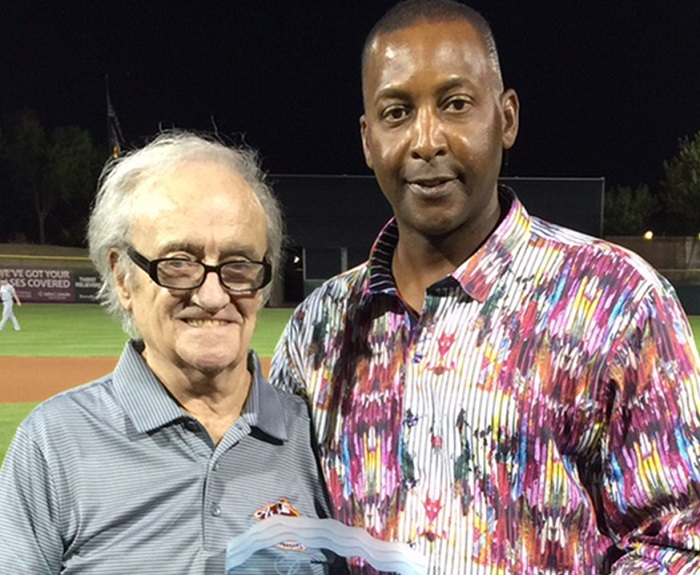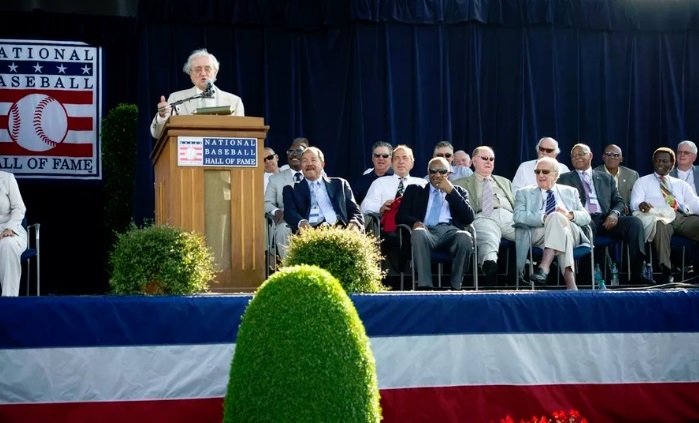The Arizona Fall League functions as a replacement for the winter leagues that flourish in Latin America following the regular minor league baseball season in North America. The AFL has gained a reputation as a league where Major League Baseball’s elite prospects go head-to-head for a six and one-half week span in October and November. For some, perhaps many prospects, it has become baseball’s premier “finishing school”.
The AFL is the brainchild of 3-time MLB Executive of the Year, Roland Hemond, who wanted to create an environment closer to home where MLB organizations could get their top prospects experience against fellow top talent following the regular minor league seasons. Beyond that Hemond envisioned a league where teams could not only develop their talent but also showcase that talent and where scouts could compare a talent pool in a close location instead of all over the country.
John Manual of Baseball America acknowledged Roland Hemond, as the “Architect of the Arizona Fall League”.
“We owe Hemond a debt for making the idea of a domestic fall/winter league, a finishing school for prospects, a reality. It seems like many 21st century baseball fans take the Fall League for granted, when we really should realize just how cool it is.”
The league honors those with long and meritorious service to the AFL with the Roland Hemond Award. The 2016 recipient of the award was Cris Jones who has evaluated, taught and mentored aspiring umpires at the Arizona Fall League since 2005.

Veteran Triple-A umpire coordinator Cris Jones receives the ‘Roland Hemond Award’ during the 2016 Arizona Fall League from the man for whom the award is named.
(Photo courtesy of MLB.com)
Roland Hemond, now 87, is still active in the Arizona Fall League. He is one of baseball’s true ambassadors and although his name is not nearly as well known outside of baseball as another baseball ambassador, the Dodgers own Tommy Lasorda, he is very well known and respected within all baseball circles.
In February 2011, the Baseball Hall of Fame announced that Hemond would become the second person to receive the Buck O’Neil Lifetime Achievement Award recognizing “the profound impact he has had on the game, for his baseball intelligence as a keen talent evaluator and in building winning teams, to the universal respect he has earned for mentoring generations of baseball executives, past and present.” O’Neil was the first winner of the award in 2008 – which now bears his name – while Joe Garagiola received the prestigious award in 2014. The next recipient will be acknowledged in 2017.

Roland Hemond receiving the Buck O’Neil Award at the National Baseball Hall of Fame in 2011.
(Photo credit – Jon Willey)
I must admit that until recently I had not even heard of Roland Hemond much less known of his impact on MLB and those who work within it. With a tiny bit of research, I soon found that there are volumes written about him and his many successes during his long connection to MLB. I was most impressed that he has not only been a successful executive and ambassador for the game but more importantly an advocate for those that the game has not properly looked after.
Hemond was born on October 26, 1929 in Central Falls, Rhode Island, a textile mill community next door to Pawtucket, Massachusetts. His father Ernest was born and raised in Rhode Island while his mother Antoinette moved to the area from a suburb of Montreal, Canada. Still fluent in French he is proud of his heritage: “We were French Canadian. Actually, I didn’t speak English until I was about six years old.”
Hemond never played professional baseball but at an early age, after four years with the Coast Guard, he began a career in baseball in 1951 with the Hartford Chiefs in the Eastern League. Within two years he signed on with the Boston Braves and the rest is a long and productive history.
As already mentioned he is a three-time recipient of The Sporting News MLB Executive of the Year (1972, 1983, 1989), who has helped build winning franchises with the Braves, Angels, White Sox, Orioles and Diamondbacks. He has served in the capacities of Scouting Director, Assistant GM, Senior Executive Vice President, General Manager, and Special Assistant to the President and CEO over his long career. Along the way, he has mentored a number of executives including Dave Dombrowski, Walt Jocketty, Dan Evans and Doug Melvin.
In reading about the life and times of Roland Hemond it became quite evident that he has a special place in his heart for baseball scouts, the group for which he became a staunch, unrelenting advocate.
He refers to the scouts as the “unsung heroes of our game”.
“A general manager is only as good as his scouts,” Hemond said, “and I was privileged to have a bunch of them who were both great talent evaluators and loyal.”
Two circumstances led Hemond to take up the cause for the scouting fraternity. First, as an executive in the Chicago White Sox organization, orders came down for him to let go a couple of long term scouts due to budgetary reasons. He had to do so knowing they had no pension plan and most likely were getting too old to find other work, scouting or otherwise, very easily.
Firing his scouts was difficult enough for Roland Hemond but he had first hand witnessed the plight of scouts who had finished their time pounding the pavement and shaking the bushes to find the next generation of MLB players.
Hemond explained, “I used to get concerned about seeing people leave the game after many years and then live in poverty and die in poverty. We’d go to spring training and you’d see people retired from all other businesses at spring training but you didn’t see the baseball people who had left the game. They couldn’t afford it. They weren’t there. You’d never see them at the major league games because they didn’t have an automobile. They wouldn’t invite you to their homes because they were embarrassed to show you where they lived. It was pitiful.”
He took matters into his own hands and in 1983 he made up his mind to try and do something to help the non-uniformed baseball personnel. At the Winter Meetings in Dallas, he made an impassioned plea, pushing for a pension plan to cover all the front office employees and scouts. Not long after, the pension plan that exists today was adopted unanimously by the owners.
“That,” said Hemond, “will always be my proudest accomplishment. We had let scouts go during labor disputes and lockouts and there were so many people who devoted their lives to the game and didn’t have any fallback for their retirement years.”
Three other annual awards are named in Hemond’s honor:
- The Roland Hemond Award, presented by the White Sox in honor of those who are dedicated to bettering the lives of others through extraordinary personal sacrifice,
- The Baseball America Award, presented to the person who has made major contributions to scouting and player development,
- The Society for American Baseball Research (SABR) Award, given to the executive who has displayed great respect for scouts.
Hemond was the inaugural recipient of both the Baseball America and SABR Awards.
“Baseball is entertainment, though for us it’s almost a religion. We have to remind ourselves we’re providing entertainment, and people can live without it. That’s why you should nurture it and respect it and recognize that we’re not in the medical field or in the food field. We’re not a necessity.” – Roland Hemond
Roland Hemond is still actively serving others. He continues to be involved in the Association of Professional Baseball Players of America that helps former and current players and baseball personnel in need. He is a co-founder of the Professional Baseball Scouts Foundation established to provide assistance to longtime scouts who are in need of special support. He serves on the board of the Scout of the Year Foundation and is still active in the Arizona Fall League.
He has also been active in the drive to include scouts in the National Baseball Hall of Fame.
This is but a thumbnail sketch of Roland Hemond and his lifetime of serving baseball and those within the game that need his help.
His entire baseball experience over 65 years has been wrapped up in a cloak of humility. Sounds reminiscent of still another great ambassador for the game, our beloved Vin Scully.
“Baseball is entertainment, though for us it’s almost a religion,” says Hemond. “We have to remind ourselves we’re providing entertainment, and people can live without it. That’s why you should nurture it and respect it and recognize that we’re not in the medical field or in the food field. We’re not a necessity.”




 December 10th, 2016 at 7:00 am
December 10th, 2016 at 7:00 am  by Harold Uhlman
by Harold Uhlman  Posted in
Posted in 

I have long wondered how and why the Arizona Fall League came to be (but was too lazy to research it).
I can honestly say that watching AFL games live and in person is a wonderful experience; as is getting autographs from the most-likely-to-be future major leaguers from within the minors. I am pained, however, by how scarcely these games are attended.
Having the distinction of being “The architect of the AFL” is a tremendous honor and well deserved by Roland.
As a side note, during my time covering the AFL this past fall, I twice tweeted out how very very good the umpires were which, of course, make Hemond’s presentation of his namesake award to Cris Jones that much more meaningful to me.
Great article on a great guy, Harold. Thanks!